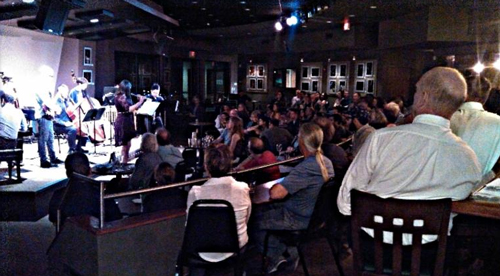by Mike Telin

On Friday, May 13 at 9:00 pm at the Bop Stop, 51XO (FiveOne Experimental Orchestra) will present “The Mashup Concert.” The program will feature mashups, overlays, and works that live somewhere in between the pop and classical worlds.
Musicians have been mashing things up for centuries in one way or another. Sometimes the desired outcome was to create a new musical style, while other times the purpose was to create comedy. Whatever the reason, creating mashups has never become passé.
Why? It’s fun.
“What makes it fun for me is exploring the connections, differences, and similarities between musical worlds,” said 51XO executive director Jeremy Allen during a recent telephone conversation. “It’s liberating to say, ‘here’s something interesting and there’s something interesting, and one came from classical music and the other from popular music.’”
Friday’s program will include songs by pop artists Whitney Houston, Frank Ocean, Gnarls Barkley, Tears for Fears, Radiohead, Flying Lotus, and Coldplay. The classical side of things will include works by Steve Reich, Philip Glass, David Crowell, Terry Riley, Collin Kemeny, Rob Kovacs, Michael Bratt, Marc Mellits, Jeremy Allen, Buck McDaniel, and Matthew Frederick.
“For my own mashup,” said Allen, “I’ve taken some material from the first and last tracks of Philip Glass’s Glassworks and mashed it with Gnarls Barkley’s Who’s Gonna Save My Soul, and Tears for Fears’ Mad World. Both of those songs work well aesthetically and musically.”
There are many sub-genres of mashup music, including overlay, crossover, and arrangements of pop tunes in the classical style and vice-versa (think Liberace), all of which will be on the program.
“There is an overlay using Terry Riley’s In C,” Allen said. He also finds it fitting to include music from Glassworks on the program because it’s a pivotal classical record due to its crossover mentality. “It dates from 1982, and Glass’s intent was to produce an album that would be in the mainstream, not just in classical music.
“We’ve also chosen some pieces by Marc Mellits (Machine V) and David Crowell (Waiting in the Rain for Snow) that are clearly influenced by popular music,” Allen said. “Marc has one foot in pop and the other in classical and he owns them both so well. It’s OK to have fun, and I think this program is a great way to end our season.”
Published on ClevelandClassical.com May 11, 2016.
Click her for a printable copy of this article



